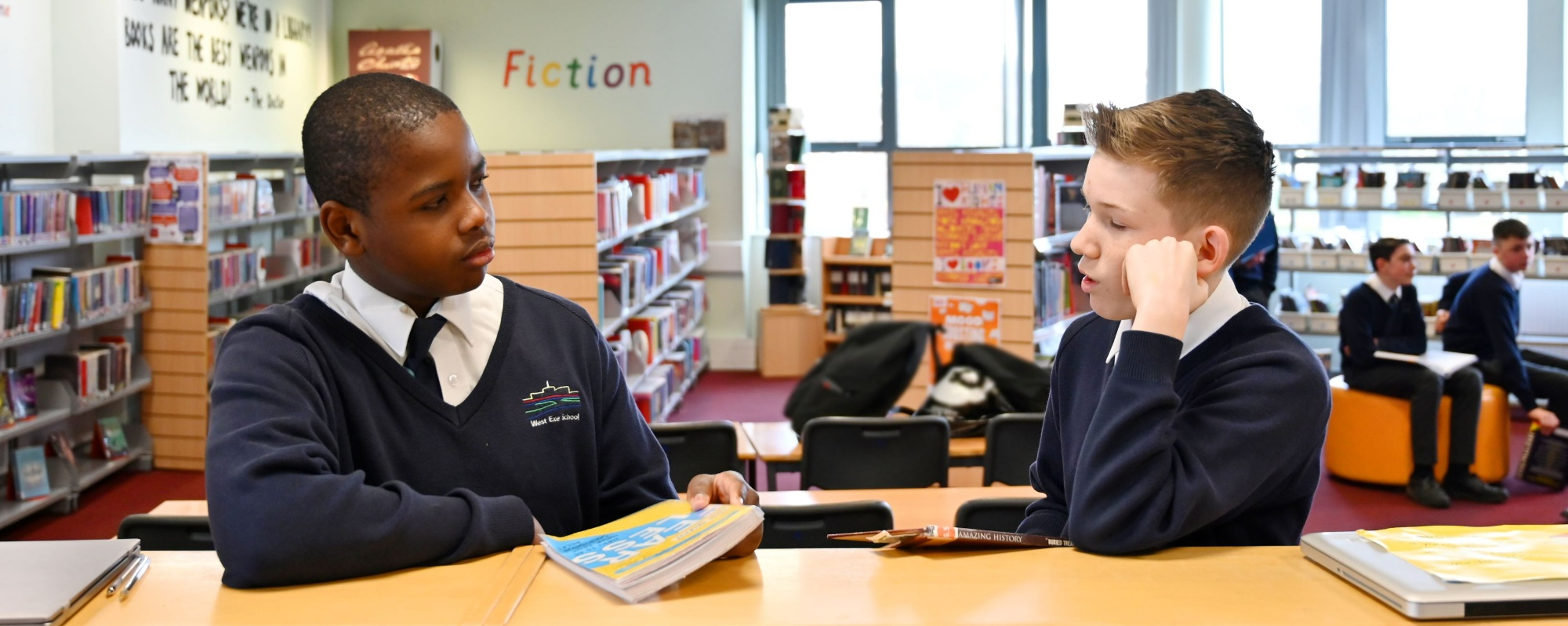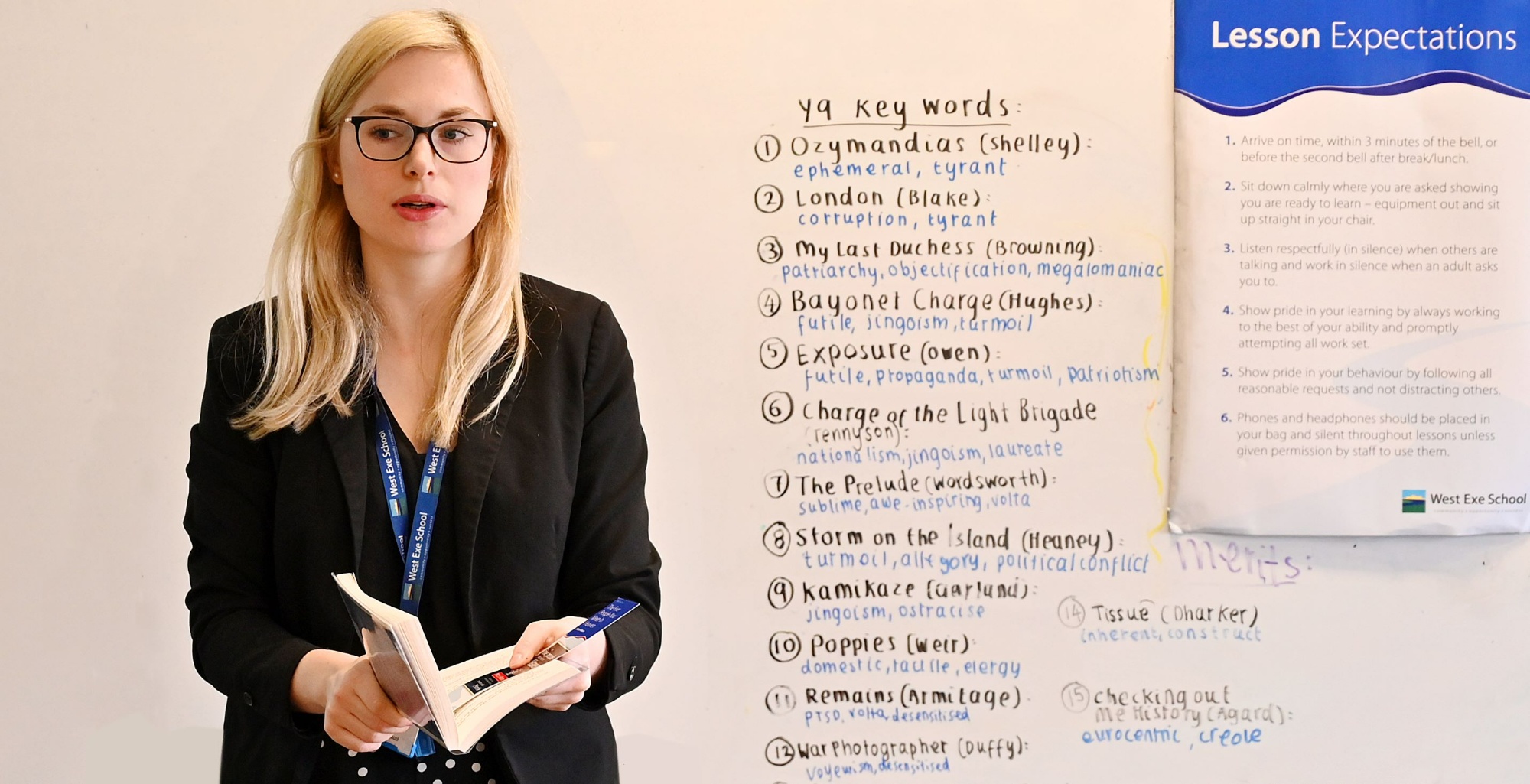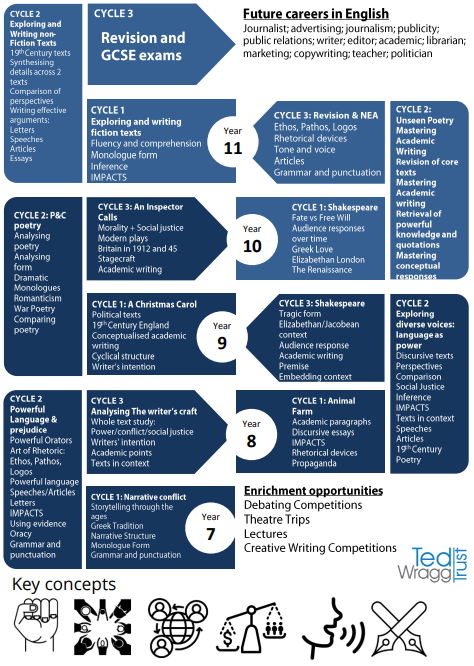English
Students will develop into critical thinkers, writers and readers who are able to articulate their understanding of the world.
Our curriculum plan aims to develop students who are confident and proficient in four key areas that we feel are fundamental to the ability to appreciate and create literature:
1. Knowledge and values
2. Speaking
3. Reading
4. Writing

We explicitly teach in depth social and literary contexts to ensure that our students have the cultural capital to appreciate how the written word can be used to bring about social change and, more importantly, social justice. To do this, we continually return to the concepts of the Role of the State, the Role of Women, Social Justice, and Gender Politics throughout their five years.



The knowledge we teach is deliberately academic content and covers a broad range of contexts that are designed to inform their interpretation of texts and ideas. This knowledge allows our students to explore perspectives outside of their own to promotes a greater understanding and appreciation of difference and diversity. Given our context in the South West of England, we believe that this understanding is vital in developing their character and empathy. Our aim is that through their study of English, they will engage with ideas beyond their social and cultural experience, and that these ideas will engender an appreciation of the importance of literature in society.
What makes us special?
In English, we lead our community of learners through a knowledge rich curriculum with high expectations and rigorous opportunities, in order to deliver a sense of satisfaction and pride from the academic study of literature and language. All of our teachers in the English department are either GCSE examiners currently, or have been in the past. This provides us with a precise knowledge of the skills students need in order to be successful in both their Literature and Language GCSE. This knowledge is reflected each year in our excellent GCSE results.
We teach every student like they have the potential for a grade 9 and that they are better than grade 5
How do we achieve this?
Each lesson begins with a starter activity that allows students to recall past learning, to ensure that the knowledge needed for success becomes embedded in their working memory. All of our staff ‘live mark’ which gives students immediate feedback on their work and allows them to make improvements on their piece of work instantly. Our KS4 Literature students are supported with their writing stamina in the form of ‘Big Writes’, where they will have an opportunity to respond to an exam style question every week.
Thank you for supporting my improvement. I have gone from writing less than half a page to over 5 pages!
Curriculum 5 Year Plan
We offer an ambitious and challenging concept driven curriculum which places ambitious texts at its heart while exploring ideas around power, conflict and social justice. Students are empowered to develop their ability to read, write and speak with fluency, confidence and clarity-expressing complex thoughts with nuance and understanding. Students will gain a conceptual understanding of how historical, cultural and societal context affects a writers’ perspective, intention and meaning and also how readers or audiences may respond to a text over time.
Success in English
In English, we know that confidence breeds success because our students are so supported in their learning, they feel able to approach a variety of texts with confidence and zeal. Our students make phenomenal progress and in 2023 our students achieved a Progress 8 score of +0.43 in Language and in Literature a Progress 8 score of +0.37, leading to an overall P8 score of +0.76 in English meaning that they out performed their peers nationally. Each year we have many students that go on to study English both at A level and beyond.
Assessment
Students are assessed in a variety of ways within English:
Responsive teaching: We monitor the success of the daily starters and tweak or repeat the questions on a daily basis. Through Live Marking we can quickly address any misconceptions and are able then to identify students that may need more support. This live marking enables us to ensure that in the next lesson we are delivering exactly what students need.
Low Stakes Assessments: The regular low stakes assessments, which take the form of extended writing tasks throughout each cycle, enabling us to add additional challenge where necessary, or to provide more scaffolding or other types of support, in order to ensure that students have achieved their best by the end of each cycle. The data that we collect on our students allows us to have a rigorous overview of each year group and to make long-term plans to provide them with support they may need in further years.
High Stakes Assessment: The end of cycle assessments are used to ensure that students are placed correctly and are a reflection of how students have responded to the scheme of learning. Students are supported in the run-up to the final assessments: we ensure that they have all the skills and knowledge in order to approach their assessments with confidence.
Knowledge Organisers
Our KOs match the lessons, meaning that any new vocabulary or concepts are embedded into the KO to support students’ learning. Students use the KOs to support their extended practice which takes the form of Cornell Notes, exam style question planning and exam style responses.
Support and intervention
Upon entry, we give students a reading test and we use these results along with the information provided by the class teacher to identify any students that may struggle with their literacy. These students are then picked up for literacy intervention, which can take place in the form of Lexia (an online package to support phonics, spelling and grammar) or for phonics lessons delivered by a specially trained member of staff.
Because we monitor students' reading ages constantly, we are able to intervene quickly with any students that are not making expected progress, which then in turn not only supports their English lessons, but lessons across the whole curriculum.
There are three Y11 English tutor groups, where students have a daily focus on improving their exam skills.
We also offer small group tutoring which runs on a six-week basis where students can work with a specialist to improve certain aspects of their knowledge.
Enrichment
Our students take part in reading challenges and writing competitions both nationally and in school.

